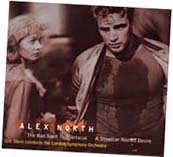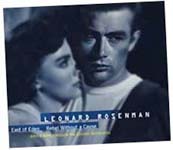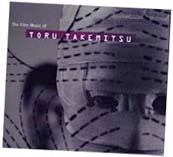Second-Class Symphonies
Can film music stand on its own?
The Nonesuch Film Series:
Georges Delerue, Music From the Films of François Truffaut;
The Film Music of Leonard Rosenman;
The Film Music of Alex North;
The Film Music of Toru Takemitsu;
$16.98 each

Hollywood composers have usually found it easier to earn money than respect. In the rarefied world of concert music, film composers were always thought of as versatile and skilled, but with nothing crucial to say. Those who had started out writing for the concert stage, as most in the studio heyday had, were assumed to have sacrificed their art to mammon. The likes of Erich Korngold (The Adventures of Robin Hood, Anthony Adverse) and Bernard Herrmann (Citizen Kane, Psycho) never stopped pressing their noses to the windows of the concert hall, bitter at the unwritten dictum, "No movie hacks need apply."
All that has changed in recent years, and the first four releases of the Nonesuch Film Series amount to a certificate of intellectual chic. The scores of East of Eden, Spartacus, Jules and Jim, Dodes'kaden, and a host of other classic films, whose music we have heard mostly squeezed stingily out of tinny television speakers, have been sumptuously rerecorded. To hear them this way--loud, full, warm, and three-dimensional--feels rather like watching the movie characters walk off the screen and into the "real" world in Woody Allen's Purple Rose of Cairo.
U ncharacteristically, the generally visionary Nonesuch is scrambling to catch a trend with this one. More typically, the label has outclassed the competition. Two of the featured composers--France's Georges Delerue and Japan's Toru Takemitsu--come from the artier world of foreign film, and even the two Hollywood scorers, Leonard Rosenman and Alex North, wrote music with a stronger bite than the bloated tone poems full of sopping strings that had become the studio standard by the 1940s. For his first film, A Streetcar Named Desire (1951), North wrote Hollywood's first jazz soundtrack, the musical embodiment of New Orleans' moist, hot nights. Rosenman even dipped into the 12-tone techniques revered by the very high priests of modernism who thought his profession was debased.
Takemitsu was the only one of the four to have been a member in good standing of the avant-garde, partly because he wrote for the cinema, rather than the movies, and partly because his film music was so abstract and his concert works so cinematic. A long (15-minute) excerpt from his score for Rikyu braids together fitful phrases of European Renaissance string music, ominous Asian pluckings, and electronic reverberations into a tapestry that is more hazily eerie than narrative. At the same time, water courses through many of his concert pieces (which have titles like "Rain Tree Sketch" and "Towards the Sea"), and Takemitsu was a master at painting rain, waves, and rivulets in sound.

T he Delerue CD is a box of bittersweets: two- or three-minute cues that deftly evoke a mood or a quick pang, and then move on. From Jules and Jim there are the plucked, fragrant melodies that stop brilliantly short of cloying, the spasm of frantic neo-Baroque fiddling from Day for Night, and the tangy sounds of an out-of-tune barroom upright from Shoot the Piano Player. In these eclectic sketches--which capture an image but have no emotional arc of their own--the irony of this project comes into focus: the contradiction of championing film music by cleaving it from film.

Those who agitate loudest to get the soundtrack recognized as the great modern genre--the conductor John Mauceri, for example--betray a prejudice toward music that is independent, nonreferential, and pure. "Once you take away the picture," Mauceri has said, "the inherent ambiguity of the music takes over." Strip the battle scene from a cue written for a battle scene, and you get not mere descriptive battle music but an abstract shard of symphony. The tension between descriptive and abstract forms of music goes back to controversies of 19th-century Germany. In one corner, Brahms and his acolytes held that music's highest aspiration should be internal perfection and self-sufficiency. Opposing them, behind Wagner and Liszt, were those for whom music was a lubricant for literature, art, or drama--just one component of a synthetic artistic experience.
These recordings would like it both ways. The cream of film scorers, they imply, are consummate collaborators, able to fuse notes and images so that each inflames the other. But the very act of issuing them on CD suggests they should be able to stand alone. If Wagner's operas can be excerpted for concert performance, and Stravinsky's ballet scores have a life of their own, why can't the soundtrack jettison its celluloid ballast and soar?
Because it doesn't work that way. Take North's celebrated score for A Streetcar Named Desire: The score's brilliance lies in the way the languorous New Orleans jazz, redolent of sin, plumes out of the dive up the street from the Kowalskis', curls along the block, and squeezes itself through a radio. As we watch, we can never be sure whether the characters are hearing the same music we are, and as the music seeps into the lives of Stanley, Stella, and Blanche, it does what jazz and the movies have always done best: It makes the squalid glamorous. But surround the soundtrack with silence and mount it in a frame of its own, and you have a stylish, silky knockoff of Duke Ellington's "Creole" style: a Hollywood makeover of a Northeastern version of raucous New Orleans jazz.
In a sense, the Nonesuch film-music series is like the Cloisters, the hodgepodge of medieval sculpture rescued from crumbling monasteries and churches all over France and patched together in New York City's Fort Tryon Park. There is something perverse about the Cloisters' demand that the essential quality of a work of art remain intact, even when it is dropped into an alien habitat. Like the Cloisters, these discs contain ravishingly crafted bits and pieces extracted from their intended setting; restored, reassembled, and asked to keep right on glowing exactly as they did before.